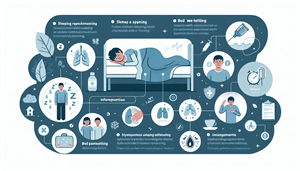
Understanding Sleep Apnea
Sleep apnea is a sleep disorder characterized by recurrent closure or constriction of the airway during the night, leading to restricted airflow and oxygen supply. The two primary types of sleep apnea are obstructive sleep apnea (OSA), which involves physical obstruction of the airway, and central sleep apnea (CSA), wherein the brain inadequately regulates breathing during sleep. The physical obstruction in OSA could be due to the collapse of surrounding tissues such as the tongue, uvula, tonsils, or soft palate, leading to airway blockage during sleep.
Indeed, adult obstructive sleep apnea is a chronic condition that requires continuous care to prevent health complications. Untreated severe obstructive sleep apnea can lead to significant health concerns such as cardiovascular complications, elevated blood pressure, risk of stroke, and potential development of depression. All of these health concerns, including other sleep disorders, are linked to disrupted breathing patterns during sleep.
Identifying the Need for Sleep Apnea Testing
The first step towards diagnosing and treating sleep apnea is recognizing its symptoms. Typical indicators of sleep apnea encompass daytime sleepiness, snoring, and morning headaches, which may necessitate further assessment for sleep apnea such as home sleep apnea testing or in-lab sleep studies. Don’t ignore these signs. If you observe these symptoms, seek advice from a healthcare provider on sleep apnea to determine if testing is necessary.
Certain individuals, due to specific personal traits or family history, as well as those with particular health conditions such as cardiac conditions, are at a heightened risk for sleep apnea and should consider undergoing testing. Testing and diagnosis of sleep apnea are critical, as untreated sleep apnea could lead to serious physical and mental health problems.
Consultation with a Sleep Specialist
Meeting with a sleep specialist is an important step to diagnose sleep apnea. During the initial consultation, a sleep specialist may inquire about symptoms such as excessive daytime sleepiness, loud snoring, and episodes of gasping for air while asleep to assess whether a patient should be recommended for a sleep study. The sleep specialist also takes into consideration the patient’s personal and family medical history, which can indicate a higher risk of sleep apnea.
Based on the initial assessment of symptoms, physical examination, and evaluation of personal and family medical history, a sleep specialist might advise a sleep study if they indicate a potential for sleep apnea.

